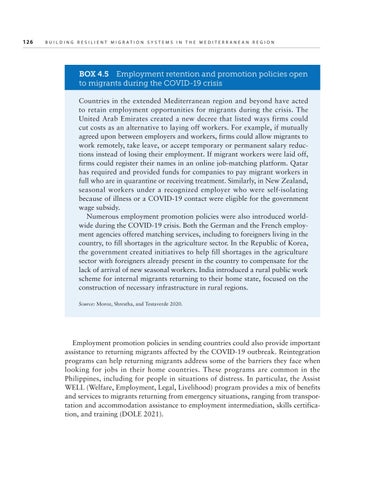126
B U ILDING RESILIENT MIGR A TION S Y STEMS IN T H E MEDITERR A NE A N REGION
BOX 4.5 Employment retention and promotion policies open to migrants during the COVID-19 crisis Countries in the extended Mediterranean region and beyond have acted to retain employment opportunities for migrants during the crisis. The United Arab Emirates created a new decree that listed ways firms could cut costs as an alternative to laying off workers. For example, if mutually agreed upon between employers and workers, firms could allow migrants to work remotely, take leave, or accept temporary or permanent salary reductions instead of losing their employment. If migrant workers were laid off, firms could register their names in an online job-matching platform. Qatar has required and provided funds for companies to pay migrant workers in full who are in quarantine or receiving treatment. Similarly, in New Zealand, seasonal workers under a recognized employer who were self-isolating because of illness or a COVID-19 contact were eligible for the government wage subsidy. Numerous employment promotion policies were also introduced worldwide during the COVID-19 crisis. Both the German and the French employment agencies offered matching services, including to foreigners living in the country, to fill shortages in the agriculture sector. In the Republic of Korea, the government created initiatives to help fill shortages in the agriculture sector with foreigners already present in the country to compensate for the lack of arrival of new seasonal workers. India introduced a rural public work scheme for internal migrants returning to their home state, focused on the construction of necessary infrastructure in rural regions. Source: Moroz, Shrestha, and Testaverde 2020.
Employment promotion policies in sending countries could also provide important assistance to returning migrants affected by the COVID-19 outbreak. Reintegration programs can help returning migrants address some of the barriers they face when looking for jobs in their home countries. These programs are common in the Philippines, including for people in situations of distress. In particular, the Assist WELL (Welfare, Employment, Legal, Livelihood) program provides a mix of benefits and services to migrants returning from emergency situations, ranging from transportation and accommodation assistance to employment intermediation, skills certification, and training (DOLE 2021).

